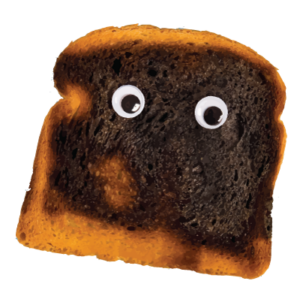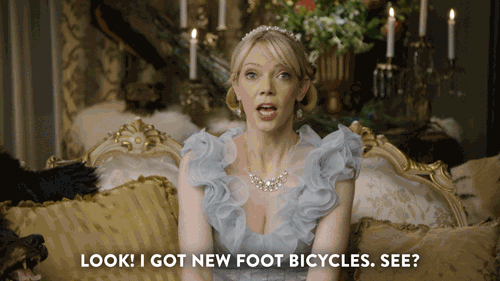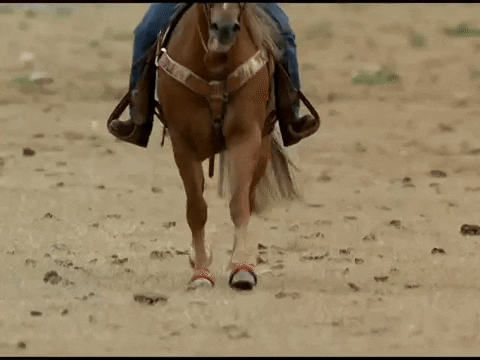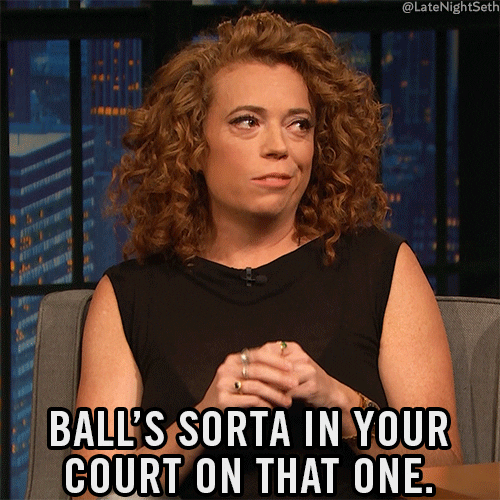Marketer Burnout: It’s not “me”, it’s “we”
Reducing burnout isn't about perks, it's about sustainable change on the part of the companies we work for.

I thought I was doing it all wrong. I was a business owner, a marketer, a mom, and a wife. And that was it.

You know that feeling when you eat too much and you’re so stuffed that you can’t move? That’s how I felt about my life: I couldn’t add anything else on to the pile without it spontaneously combusting. I kept telling myself that I couldn’t be doing this right. I was somehow not skilled enough to navigate a world that everyone else seems to be navigating perfectly fine.
Then the pandemic hit. And all of a sudden I was also a teacher and a protector of the small circle of friends we were keeping for our daughter. We lost every single client.
If anxiety, depression, and burnout could manifest as a cartoon, it would be a piece of burnt toast with googly eyes lolling around aimlessly. I was done. But, worst of all, I was numb.
Marketer Burnout is Real, Folks
Most marketers have been “here” within varying circumstances. Pummeled by obligation and an “always-on” society, the lack of rest starts to wear the soul threadbare. In A History of Self Care, Aisha Harris writes for Slate that in 2016, self-care officially crossed over into the mainstream.
As if in a well-timed orchestra of nonsense, in 2018 the definition of the term “burnout” was revised by the International Classification of Diseases. From there it exploded into the general consciousness, being used even more widely than before. The new definition reads:
“Burnout is a syndrome conceptualized as resulting from chronic workplace stress that has not been successfully managed. It is characterized by three dimensions: 1)feelings of energy depletion or exhaustion; 2) increased mental distance from one’s job, or feelings of negativism or cynicism related to one’s job; and 3) reduced professional efficacy. Burnout refers specifically to phenomena in the occupational context and should not be applied to describe experiences in other areas of life.”

Get this: despite the overwhelming number of people experiencing burnout (in 2022, we saw a 38% increase in people experiencing occupational burnout per the American Psychological Association), it’s apparently not considered a medical diagnosis. It just turns out to be the conglomeration of crappy circumstances. At least that’s what the Mayo Clinic reports.
I may not have a medical diagnosis on my medical chart that reads “burnout”, but I do have a pretty good anxiety medication, pretty big life changes in the hopper, and a new pair of roller skates thanks to my experience with the syndrome. Maybe if we promise each person that clocks in as burned out, we can give them roller skates and consolation prizes? Yay?
Burnout: It Isn’t You, It’s Them

American individualism (that’s where we are) implies that we’re lone riders, able and willing to direct our horse the way we want it to go. When you turned those ingrained values on the way you work, there’s a distinct and unfortunate gap between reality and the situation at hand (I’m still arguing with my father-in-law on this one to this day). If we were to remove the internalization around burnout and look at the experience we’re having without judgment, we’d be forced to see what’s really happening. And there’s no amount of yoga, deep breathing, bubble baths, or pedicures to fix *gestures wildly* all of this.
It’s not you, it’s THEM.
The system we’re working within isn’t designed to support you at any level. Start from the foundation of your life––if you have a family, we can look at the American Healthcare system (hello, debt!), lack of familial leave, bananas-expensive child care (it’s literally a mortgage payment), and add to that the increasingly unstable security of schools to contend with (who doesn’t want to stress about an AK showing up on their kid’s playground?). Being part of a family is a mess. And because it’s a mess, it makes your ability to focus on work even less likely. Don’t even get me started on the completely broken capitalistic system that routinely crushes us by focusing on productivity at all costs.
The causes of burnout, as reported by the Maslach Burnout Inventory, report that burnout is caused by the following scales:
- feelings of being emotionally overextended and exhausted by one’s work
- unfeeling and impersonal response toward recipients of one’s service, care treatment, or instruction
- feelings of competence and successful achievement in one’s work
In fact, a 2019 Harvard Business Review article, Burnout is About Your Workplace, Not Your People put it best:
“…evidence is mounting that applying personal, band-aid solutions to an epic and rapidly evolving workplace phenomenon may be harming, not helping, the battle. With “burnout” now officially recognized by the World Health Organization (WHO), the responsibility for managing it has shifted away from the individual and towards the organization. Leaders take note: It’s now on you to build a burnout strategy.”
Listen Up, Marketing Leaders

HBR also reports that “worldwide, 615 million suffer from depression and anxiety and, according to a recent WHO study, which costs the global workforce an estimated $1 trillion in lost productivity each year.” It’s time to poop or get off the pot, as they say. If “The Great Resignation” taught us anything, it’s that retention is hard and needs to be nurtured in the same way you nurture your leads.
There are a few basic rules to keeping employees happy and avoiding burnout:
- People need rest
- People need resources
- People need support
- People need meaning
- People need fun
I’m sure there are tons of research points to back all of this up, but at the moment, you’re just going to have to trust me. Lived and otherwise, this list is real. TLDR; as marketers, we’re exhausted, we’re changing things, and we need help.


How Burned Out Are You?
We're not even bothering to ask if you're burned out, we're wondering how burned out you are. Take our fun 15-question quiz and get:
- An understanding of where you fall on the "toast-o-meter";
- How that may manifest in your work and home life;
- Tips you can use to cool off